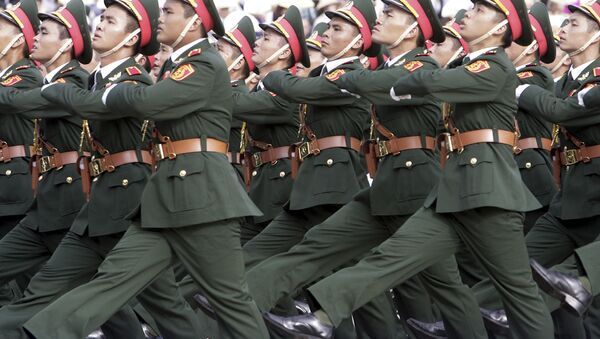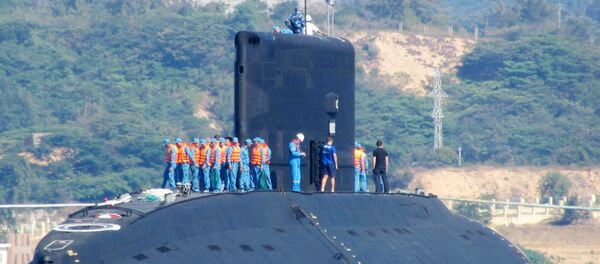Russian Foreign Minister Sergei Lavrov said that the United States demands, “through their ambassadors, that Latin America, Asia, and Africa refuse to buy military equipment and weapons from us, promising that the United States will compensate for the equipment shortages in a particular country.”
Vietnam is currently one of the largest buyers of Russian weapons in the world. In recent years, contracts worth more than $4.5 billion have been signed. But as of recently, Vietnam has shown an interest in the weaponry of other exporting countries. Its list of its partners also includes Israel and India, as Hanoi aims to diversify its arms purchases.
Will Vietnam move away from Russian weapons imports and switch to importing them from the US, as Washington hopes?— Sputnik discussed this with Vietnamese military expert and Major-General LE Van Cuong.
“No matter how hard Americans try, they will not be able to force Vietnam to change course. Washington is like a salesman, and as a salesman it will advertise, persuade and use various levers to sell as many weapons as possible, that's what happened to Saudi Arabia, with which contracts worth up to $100 billion have been signed. But with Vietnam this will not work.”
Major-General LE Van Cuong explained why: “There are several obvious reasons for this. First of all, all branches of the Vietnamese armed forces are equipped with various Soviet and Russian weapons. The quality of Russian military equipment proved itself in the wars that Vietnam waged against its aggressors for its freedom. It's no secret that during the Vietnam war, even American soldiers liked the Soviet AK-47 rifles more than the American 'kings of bullets', the AR-15 (M16) or M4A1.”
READ MORE: Russia, Vietnam Develop Economic Ties With Billion Dollar Investment Deals
Major-General LE Van Cuong also explained that the Vietnamese armed forces have 70 years of experience using Soviet and Russian weapons, and that's the main point, noting that the Vietnamese have an expression "No theory will replace practice."
“Everyone likes to use familiar things, including military equipment. In Vietnamese universities we are taught how to use Russian weapons. For the Vietnamese army, the use of Soviet and Russian weapons has become a tradition, and this tradition cannot be quickly suspended. The current economic situation in Vietnam won't allow for such a radical turn in the purchase of weapons and defense equipment.”
LE Van Cuong noted that Russian weapons have been successfully adjusted for Vietnam.
“The decisive factor in war is the human factor. Not only have the Vietnamese soldiers skillfully used Soviet weapons during the 1954-1975 war, but our technical specialists have enhanced them with regard to natural conditions and combat situations. For example, the SAM-3 anti-aircraft missile was modernized, Vietnamese MiG-17 and MiG-19 pilots were able to shoot down the unbeaten F16 and B-52, so Russian technology, combined with the brains and the skill of the Vietnamese, became a huge force leading to victory.”
READ MORE: 'Pragmatic Interest': Why Russia's Ka-52 Should Be Copter of Choice for Vietnam
Today, in the current state of international affairs, Vietnam pursues a policy of diversifying purchases of military equipment.
Major-General LE Van Cuong believes that, considering the potential enemy and the country's specific defense requirements, it's “likely to buy some early warning marine defense systems from the US, but in limited quantities. Vietnam cannot spend hundreds of billions of dollars on these weapons. The general structure of weapons is becoming more complex, their diversity increases, but Russian weapons remain a component. I can even predict the share of US weapons — 10%, with 85-90% — Russian. There's one tactical nuance in the process of diversification of arms purchases. Many of the Chinese army's weapons have been bought from the Soviet Union and Russia, and it's inconvenient for both countries to use the same arms, that's why Vietnam needs to diversify its supplies,” said LE Van Cuong.
“Russian weapons have demonstrated their reliability. Russia and Vietnam have a traditional relationship based on trust, tested by years of war and peace, which has now grown into a comprehensive strategic partnership. If now we completely switch to American weapons, where's the guarantee that the United States will not make us completely dependent on them? Looking into the future, we must not forget the lessons of history,” LE Van Cuong concluded.
The views expressed in this article by Major-General LE Van Cuong are solely those of the speaker and do not necessarily reflect the position of Sputnik.



